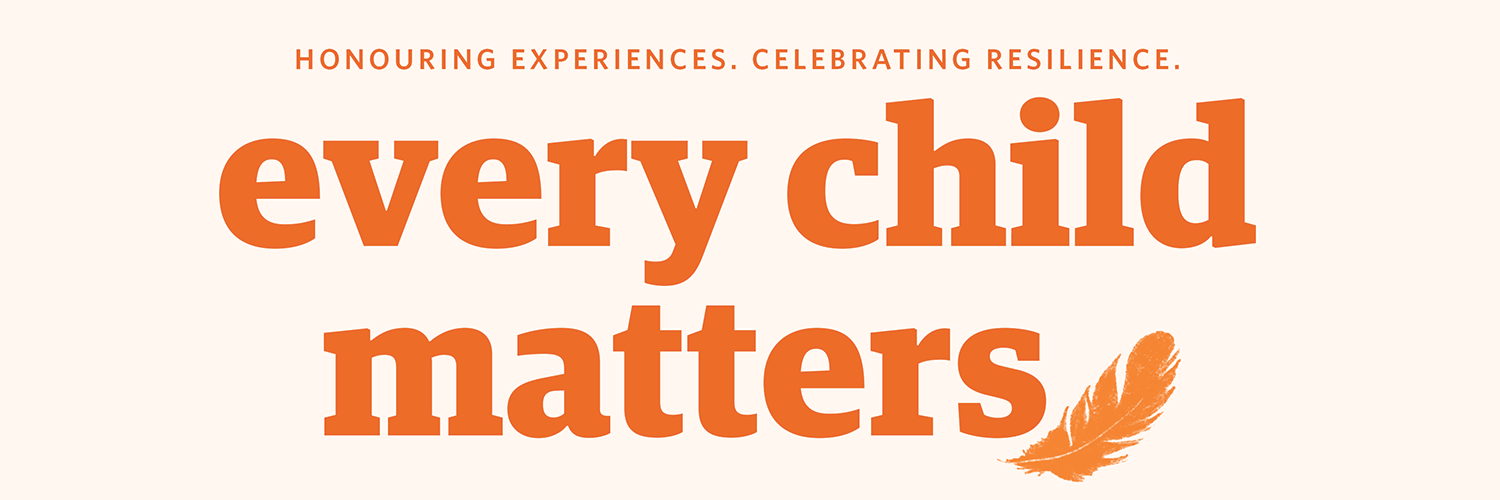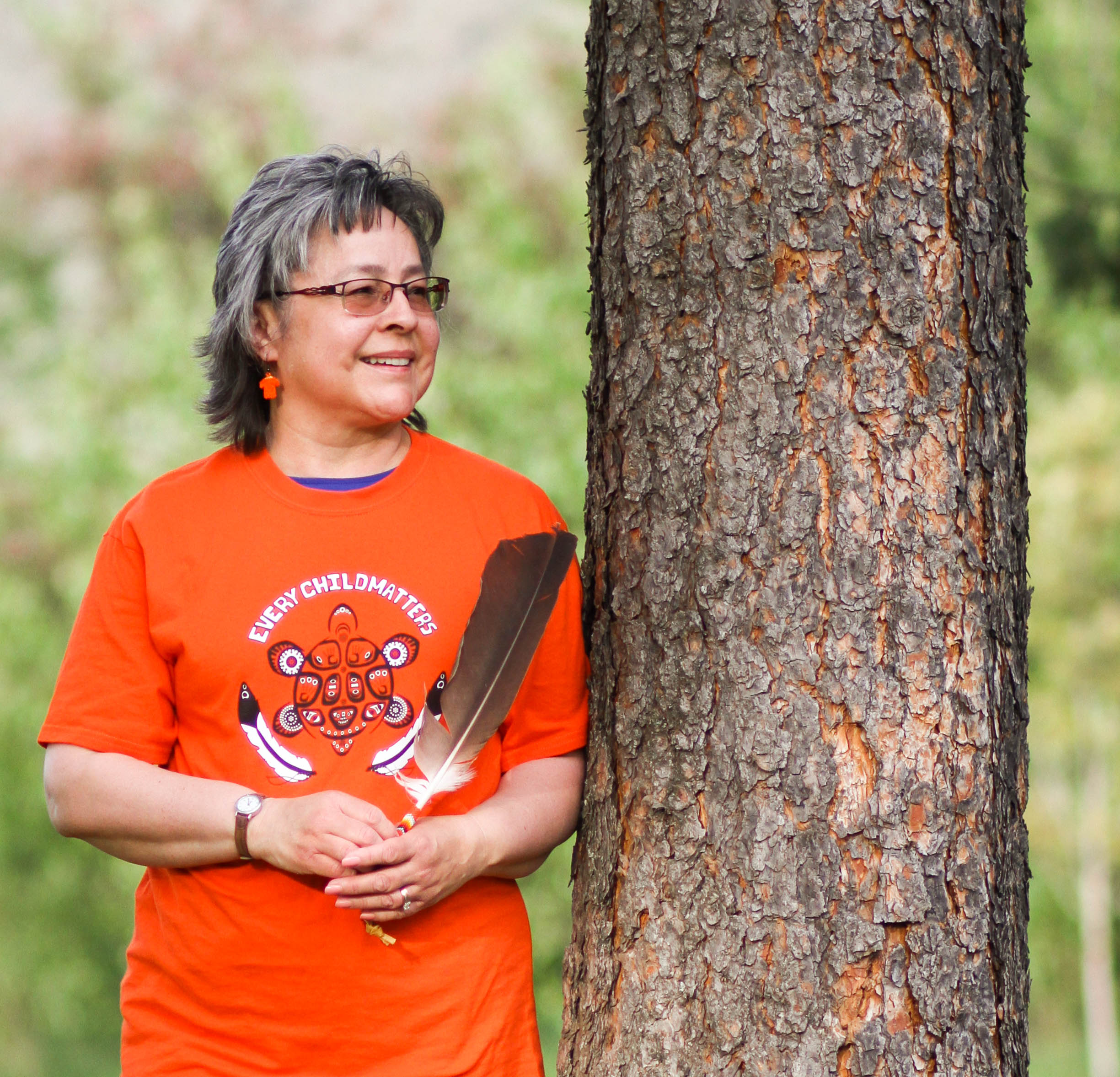
Every year on September 30th, people across Canada participate in Orange Shirt Day to recognize and raise awareness about the history and legacies of the residential school system in Canada. Orange shirts are worn to honour all Survivors and intergenerational Survivors, and remember those children who never made it home.
Orange Shirt Day originates from the story of Phyllis Webstad from the Stswecem’c Xgat’tem First Nation. In 1973, Phyllis was excited about her first day at St. Joseph’s Residential School in Williams Lake, B.C. Her granny had even bought her a new, bright orange shirt for the occasion. But when she arrived at the church-run residential school, six-year-old Phyllis had her hair cut and was stripped of her clothes, including her brand new shirt. She never got it back.
40 years later, on September 30th, 2013, Phyllis began the first-ever Orange Shirt Day.
For her, the colour orange represents what residential schools stole from Indigenous children and families – sense of identity, connections to kin and culture, sense of self-worth and value.
“The colour orange has always reminded me of that, and how my feelings didn’t matter, how no one cared, and how I felt I was worth nothing.”

Wear Orange
Order a T-shirt, button or other merchandise from the Orange Shirt Society, or purchase a shirt from UBC Bookstore while supplies last.
The Origins of Orange Shirt Day
Learn more about Phyllis Webstad and what Orange Shirt Day means for Survivors.
Learn, Share, Act
Explore resources for people of all ages to learn about the ongoing legacy of residential schools and share them with colleagues, friends and family.
In late May 2021, the community of Tk’emlups te Secwepemc announced that 215 unmarked graves had been discovered at the former Kamloops Indian Residential School. The discovery prompted national and international responses and community-led calls to action to search the grounds of other former residential schools.
In July 2021, Tk’emlups te Secwepemc launched the Oral Testimony Project to support Survivors wishing to provide oral testimonies about missing children, deaths, and unmarked graves.
Wellness Resources
We recognize that engaging with Indian Residential School histories and legacies can lead to emotional reactions and difficult thoughts and feelings. The following resources are available:
Crisis Support Lines
- National Indian Residential School Crisis Line – Indigenous Services Canada offers a national Indian Residential School Crisis Line to support former Residential School students. The crisis line provides emotional and crisis referral services 24 hours a day.
- 1-866-925-4419
- Indian Residential School Survivors Society (IRSSS) – provides essential services to Residential School Survivors, their families, and to those dealing with intergenerational traumas.
- Main: (604) 985-4464
- Toll free: 1-800-721-0066
- KUUS-US: The KUU-US Crisis Line Society operates a 24-hour provincial Aboriginal Crisis line for: adults, elders and youth https://www.kuu-uscrisisline.ca/
- Adult/Elder Crisis Line: 250-723-4050
- Child/Youth Crisis Line: 250-723-2040
- BC Wide Toll Free: 1800-KUU-US17 (1800-588-8717)
- Métis Crisis Line BC Toll Free: 1833-MétisBC (1833-638-4722)
- The Hope for Wellness Help Line offers 24-hour immediate mental health counselling and crisis intervention to all Indigenous peoples across Canada.
- 1-855-242-3310
- Chat Line: https://chat.fn-i-hopeforewellness.ca/
- Métis Crisis Line – a service of Métis Nation British Columbia. Call 1-833-MétisBC (1-833-638-4722).
- 310 – Mental Health Call 310-6789 (no area code needed) toll-free anywhere in B.C. to access emotional support, information and resources specific to mental health and substance use issues. Available 24 hours a day.
Culturally Safe Mental Health Supports
- Tsow-Tun Le Lum Society – provides confidential outreach services such as counselling, cultural supports and personal wellness programs. Call toll-free 1-888-403-3123 or visit tsowtunlelum.org.
- Indian Residential Schools Mental Health Support Program – (Government of Canada) provides mental and emotional health support services to eligible former Indian Residential School students and their families throughout all phases of the Indian Residential School Settlement Agreement, for more information phone Toll-Free 1-877-477-0775.
- First Nations Health Authority (FNHA) Mental Wellness & Counselling Support through Health Benefits For detailed information and a list of providers registered with health benefits visit fnha.ca/benefits/mental-health or call 1-855-550-5454.
- First Nations Virtual Doctor of the Day (FNHA) – provides virtual health care and referral support for people who do not have a doctor or are unable to get an appointment. It is for all First Nations people living in BC and their family members, including family members who are not Indigenous. Doctors are available by video or phone from 8:30 a.m. to 4:30 p.m. every day. Call 1-855-344-3800 to book an appointment. Learn more at fnha.ca/virtualdoctor.
Counselling for Indigenous UBC Students
- UBC Indigenous student Counselling: Student Health – Indigenous Portal (ubc.ca)
- UBC Employee Family Assistance counselling
211 Services Across Canada
211 is a phone/online directory to find and navigate social services in the province of B.C and all of Canada. Services are available 24/7, either by calling 2-1-1 or searching provincials websites Help Starts Here – 211.ca
- British Columbia – 211
- Website: bc211
- Email: help@bc211.ca
- Alberta – 211
- Website: 211 Alberta
- Email: info@ab.211.ca
- Saskatchewan – 211
- Website: 211 Saskatchewan
- Email: 211sask@unitedwayregina.ca
- Manitoba – 211
- Website: Manitoba 211
- Email: 211@volunteermanitoba.ca
- Ontario – 211
- Website: Ontario 211
- Email: gethelp@211ontario.ca
- Quebec – 211
- Website: Social and Community Information (211qc.ca)
- Email: info@211quebecregions.ca
- New Brunswick – 211 or 1-855-258-4126
- Website: Organization / Program Search (nbinfo.ca)
- Email: 211nb@findhelp.ca
- Nova Scotia – 211
- Website: 211 Nova Scotia
- Email: help@ns.211.ca
- Prince Edward Island – 211
- Website: Home | 211 PEI
- Email: info@pe.211.ca
- Newfoundland and Labrador – 211
- Website: 211 – United Way (unitedwaynl.ca)
- Email: info@nl.unitedway.ca
- Yukon – 211 or 667.2003
- Website: Yukon 211 | United Way Yukon
- Email: ed@unitedwayyukon.ca
- Northwest Territories: Only 2-11 number, no website or email available
- Nunavut: Only 2-1-1 phone number available, no website or email available.
